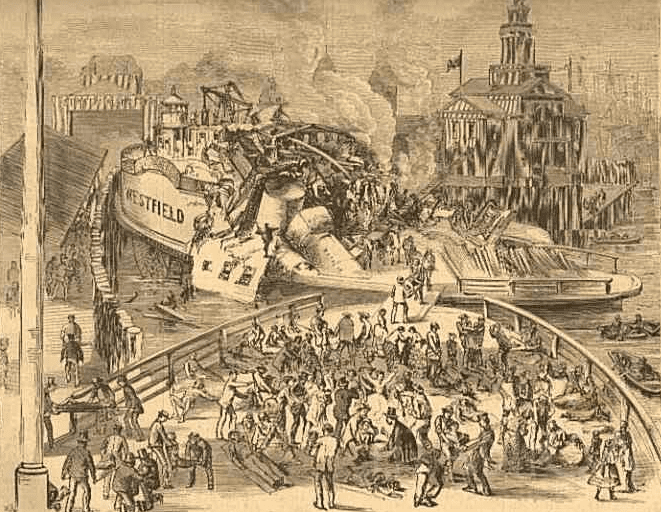
 The following is from the Harpers Weekly of August 12, 1871. It was transcribed by Hudson River Maritime Museum contributing scholar Carl Mayer.
The following is from the Harpers Weekly of August 12, 1871. It was transcribed by Hudson River Maritime Museum contributing scholar Carl Mayer.
About half past one Sunday afternoon, July 30, [1871] the Staten Island ferry boat Westfield was lying quietly in her slip at the foot of Whitehall Street, New York. Over four hundred souls were on board, lured by the delightful weather from their crowded homes to breathe the pure sea air and enjoy the grass and shade of the uncontaminated country.
Everything was in readiness for the start. The captain was at his post, the engineer was on his way to the engine room, men were standing ready to unhook the chains, when suddenly there came a terrible crash, and in an instant the steamer was a wreck.
Those who witnessed the disaster say that first there was a dull crunching sound, somewhat like that made by the fall of a large building, followed immediately by the sharp hiss of escaping steam.
The main deck was forced upward for a considerable distance; the beams and planks were torn into fragments. Many of them were thrown high into the air, and fell back in a confused mass into the hold.
The pilot house, which was directly over the boiler, was hurled into the air to a great height, and falling back upon the hurricane deck was shattered to pieces.
The pilot was in the house, and yet, strange to say, aside from a few severe scratches and contusions and a severe shock, escaped unhurt. He could scarcely believe that he was not mortally injured, as he crawled from the ruins and saw the havoc and desolation that had been made.
The heavy smoke stack was also blown high in the air and fell into the general wreck. The escaping steam filled the boat, and many were scaled who would have otherwise escaped unhurt.
The part of the boiler which gave way was opposite the fire box, and toward the bow of the boat. Such was the force of the explosion that a piece of the upper half of the shell of the boiler, twenty feet in length and weighing two tons, was hurled forward a distance of twenty-five fee, and lodged in the bow. The fracture apparently started at a place where the boiler was patched to cover a defect.
A majority of the passengers were collected on the main deck, directly over the boiler. These were blown into the air to the height of thirty or forty feet, falling back into the wreck, or into the water. Happy were those who died instantly! Scores of men, women, and children who escaped the full force of the explosion were immediately enveloped in a scalding cloud of steam.
The scene of the boat was harrowing. Groans and loud screams of agony came from the scalded, wounded, and dying. Parents were eagerly seeking their children, children for parents, friends for friends. Many in their panic leaped overboard, some were rescued by boats that surrounded the wreck, while others sank at once and were drowned.
The Police and Fire departments called upon for assistance, and at once furnished men and means to convey to the hospitals such sufferers who could be moved.
A pitiable sight they presented when brought upon the docks. Many had the skin almost entirely scalded from the face, neck, and breasts. Others had lost portions of their hair, from the scalp literally being parboiled and peeled off. Others were covered with ghastly wounds, and all were begrimed with soot and dust.
As fast as possible the sufferers were removed to the hospitals, where the utmost that surgical skill could do was done to relieve them. In spite of every attention, many died after their removal. The number of the victims has not been fully ascertained. It is thought that between forty and fifty were killed outright, and that the list of fatalities may be swelled to a hundred by deaths in the hospital.
The cause of the explosion has not been ascertained. Various surmises are afloat in regards to it. Only two months ago, the United States inspector of boilers inspected the Westfield and pronounced it safe.
The engineer, a colored man, is said to be capable and trustworthy. He states that just before the explosion took place, he found the water in the boiler all right, and the steam gauge indicating a pressure of twenty-seven pounds.
A fragment of the boiler picked upon the dock was pronounced by good judges to be unsound iron. It was taken to police headquarters to be produced before the coroner’s jury, when the questions of cause and responsibility will be fully inquired into.


